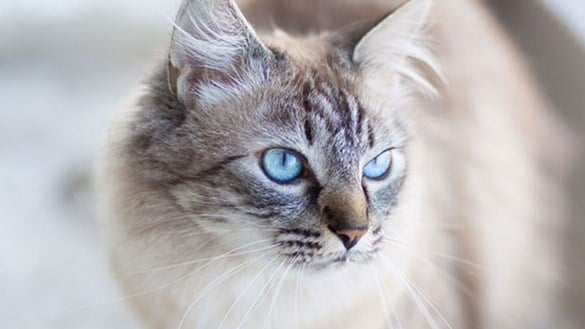How To Tell If Your Cat Is Blind Or Deaf
With the right care and attention, cats often adapt well to sensory issues. Read more about how you can tell if your cat may be deaf or blind and how to care for them.

Sensory issues in cats
Cats can develop sensory issues for several reasons, including old age, illness and injury. The most common issues include the loss of sight or hearing.
With the right care, cats who are deaf or blind can still maintain a great quality of life. Cats have an incredible ability to rely on their other senses, allowing them to go about their daily lives without too much difficulty.
Deafness in cats
What causes deafness in cats?
The most common causes of deafness in cats are:
- Old age
- Genetic defects
- Tumours and growths in the ear canal
- Injury
- Untreated ear infections
- Neurological problems
Are white cats deaf by birth?
Some cats are at a higher risk of genetic defects, which can cause deafness from birth; white cats with blue eyes are by far the most likely to develop hearing loss. This is due to a gene which is common in these types of cats, which is also responsible for white fur and blue eyes. Not all white cats with blue eyes will be deaf.
Temporary deafness in cats
Deafness can be temporary, caused by blockages or mild bacterial, fungal and parasitic infections. It can also be a side effect of certain medication, so always consult your vet for potential treatment.
How to tell if your cat is deaf
Cats are experts in using all their senses to understand or react to their surroundings, so it can be tricky to identify whether your cat is deaf.
Deaf cats may not turn around when you approach them and may not react to loud or surprising noises. They can often be difficult to wake up and may start to meow louder than normal.
A good test of their hearing is to position yourself behind them, cover your mouth (so they can’t feel your breath) and hiss. This is a universal sound of danger, so if your cat doesn’t respond there may be an issue.
Hearing loss is usually a gradual process, so you may not be able to spot it right away. If you’re unsure, or you think your cat is losing their hearing, speak to your local vet for advice.
Looking after a deaf cat
Deaf cats are often exposed to increased dangers, especially when outdoors; they may not hear an oncoming car or an aggressive animal that might pose a threat.
Adjusting to hearing loss can be very difficult. If you have a garden, transform it into a safe, cat-proof haven so they can maintain their outdoor life while staying protected from dangers - tall fencing and overhead netting both work well. If providing a safe outdoor space isn’t possible, your cat should be kept indoors at all times. ‘Catios’ are being popular amongst cat owners that are keen to keep their cat safe but allowing them to get fresh air and some space to roam.
Whether inside or outside, don’t forget to provide lots of interesting places or objects for them to explore and display their natural behaviours.
Aside from keeping them safe, you’ll also need to adjust the way you communicate with your cat as they lose their hearing. For example, replace voice commands with hand signals or use catnip-scented toys.
Deaf cats can be easily startled, so always approach your cat in their line of sight.

Blindness in cats
Causes of blindness in cats
Age-related causes of blindness are much less common in cats than in dogs, although they can still happen. The most common causes of blindness in cats are:
- Injury
- Glaucoma
- Toxoplasmosis
- Infection
- High blood pressure
If you notice any issues with your cat’s eyes, such as weeping or inflammation – you should ensure that you bathe them in warm water. For consistent or recurring issues, you should see your vet. Untreated eye infections can lead to issues in the future.
How to test if your cat is blind
If your cat appears more cautious or disoriented, this may be a sign that they are starting to lose their sight. Your cat may also be easily startled or confused when you approach them, and they may misjudge heights when jumping on or off objects.
There may also be signs with the eyes themselves, they may become cloudy, discoloured, or inflamed. The pupils may also be large and won’t contract in the light.
If you think your cat is experiencing blindness, you should always speak to your vet.
Caring for a blind cat
While their sight is still important to them, cats often rely more on their hearing and sense of smell, so many cats adapt well to blindness.
Try and keep your home environment as consistent as possible, e.g. not moving furniture, litter trays, or food and water bowls. You should also try and keep your cat indoors as much as possible or build a cat-friendly outdoor enclosure to help keep them safe outside.
Blocking off stairways, balconies and decking can help keep blind cats safe, and always keep the toilet lid closed to avoid accidents. Blind cats tend to respond well to noisy or scented objects, so investing in toys with bells, rattles, and catnip helps stimulate their senses while maintaining a great bond.
Constantly talking to your cat will help them locate you about the house and maintains a sense of security. If you have other pets, you may want to add a bell to their collar for the same reason.
If you are worried about your cat’s vision or hearing please speak to your local Medivet practice for advice
Blindness in cats FAQ
Degrees of blindness can vary between cats, but some common symptoms of blindness in cats include cloudy eyes, uneven or very wide pupils, issues with coordination, hiding, nervousness, reluctance to go outside, changes in behaviour.
It depends on the cause and extent of blindness which will determine whether blindness in a cat can be reversed. The earlier a cat’s vision problems are diagnosed, the better they can be treated unless the blindness has already become irreversible by the time veterinary care is given. If your cat’s eyes are developing a white or grey colour in the pupil, this is likely to be cataracts which is irreversible. If it is conjunctivitis or another eye infection, the sudden onset blindness can sometimes be reversed if you contact your vet immediately.
Cats can lose their hearing as they age, just as many humans do. Some cats are born partially or completely deaf because of a genetic defect called congenital deafness. Usually, congenital deafness is related to pigment and most of the affected cats have an all-white or mostly white coat and blue eyes. If the loss of hearing is sudden, this is usually the result of illness or injury.
Due to a genetic defect, all-white, or mostly white cats with blue eyes tend to go deaf more than cats of any other colouring.
Your cat might be disorientated, and have issues with coordination, especially at night. You should keep your blind cat indoors, whilst ensuring that your garden is secure. It’s essential that you microchip your cat in case they escape. Encourage your cat to walk around alone – they will leave a scent trail making it easier for them to follow for familiarity. Take other precautions to prevent accidents such as keeping them off high surfaces, placing barriers across the stairs and talking gently to them to avoid startling them.
Your cat may lose their sight for a number of reasons, including old age. The most common cause of blindness in an elderly cat is high blood pressure (hypertension).
Deaf cats may make more noise than cats who can hear. Deaf cats may purr and meow louder, and they may also enjoy visiting an area with a lot of echo, such as a shower room, and shriek as they will enjoy feeling the reverberations of their own voice echoing back at them.
For more helpful advice on caring for a blind or deaf cat, speak to your local Medivet team.

Medivet Healthcare Plan
On average our clients save up to £280 each year with the Medivet Healthcare Plan.
Learn more

Pet Care & Advice
At Medivet, we’re committed to providing trustworthy, expert advice that helps you care for your pet.
Search advice

